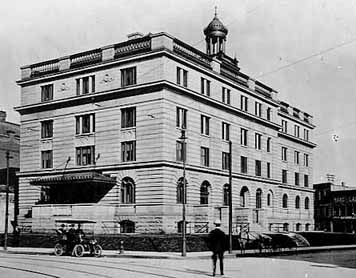Difference between revisions of "Old Ramsey County Jail"
(table) |
m (Protected "Old Ramsey County Jail" [edit=sysop:move=sysop]) |
||
| (One intermediate revision by one other user not shown) | |||
| Line 4: | Line 4: | ||
| − | William Williams, a young itinerant laborer, met teenager Johnny Keller while the two were hospitalized—they became close friends and even took vacations to Winnipeg together. Their close relationship spurned the ire of Keller’s father, who considered their relationship as unnaturally close. Keller senior bluntly told Williams that his son was better in the absence of his company—even if that meant Johnny’s placement in a Reform School. Based upon letters unearthed by adjunct University of Minnesota Professor John Bessler, one can gather that Williams’ bore most of the emotional attachment. He once wrote: “I want you to believe that I love you now as much as I ever did. It won’t be long before we will be together.” | + | {| {{prettytable}} |
| + | ! | ||
| + | ! | ||
| + | |- | ||
| + | | [[Image:Svc williams.jpg]] <div style="text-align: center;"><small>'''''The St. Paul Pioneer Press'', 2/12/1906'''</small> | ||
| + | </div> | ||
| + | | William Williams, a young itinerant laborer, met teenager Johnny Keller while the two were hospitalized—they became close friends and even took vacations to Winnipeg together. Their close relationship spurned the ire of Keller’s father, who considered their relationship as unnaturally close. Keller senior bluntly told Williams that his son was better in the absence of his company—even if that meant Johnny’s placement in a Reform School. Based upon letters unearthed by adjunct University of Minnesota Professor John Bessler, one can gather that Williams’ bore most of the emotional attachment. He once wrote: “I want you to believe that I love you now as much as I ever did. It won’t be long before we will be together.” | ||
| + | |||
| Line 12: | Line 19: | ||
! | ! | ||
|- | |- | ||
| − | | The presiding judge gave Williams the death penalty, and this was affirmed by the Minnesota Supreme Court. | + | | The presiding judge gave Williams the death penalty, and this was affirmed by the Minnesota Supreme Court. |
| − | + | On the day of his death in February of 1906, Williams was defiant and claimed that he never had “improper relations” with his friend. | |
| − | |||
| − | |||
|<div style="text-align: center;"> | |<div style="text-align: center;"> | ||
| Line 24: | Line 29: | ||
<small>'''The "City Jail" ca. 1906, when Williams was hanged in the basement. Courtesy of the Minnesota Historical Society'''</small> | <small>'''The "City Jail" ca. 1906, when Williams was hanged in the basement. Courtesy of the Minnesota Historical Society'''</small> | ||
</div> | </div> | ||
| + | |} | ||
| + | |||
| + | |||
| + | His hanging did not go as planned—when the county sheriff released the trapdoor, Williams dropped to the ground. Embarrassed that he miscalculated the rope length, the Sheriff and two other officers simply pulled Williams up by hand until he died after 17 minutes of struggle. | ||
| + | |||
|} | |} | ||
Latest revision as of 11:26, 1 May 2010
322 St. Peter Street, St. Paul, MN. (February 13th, 1906)
The gruesome nature of Smith’s hanging—together with the presence of newspaper reporters at the scene—led to Minnesota lawmakers eventually repealing the state’s capital punishment laws. The old jail where Williams died was demolished in the 1930s, and is now the site of the Ramsey Co. Courthouse/St. Paul City Hall.
Information for this page is paraphrased exclusively from the research of John Bessler. His article, "The Botched Hanging of William Williams," is available with more information at http://archives.secretsofthecity.com/magazine/reporting/features/botched-hanging-william-williams
It is also available in his book: Bessler, John. Legacy of Violence: Lynch Mobs and Executions in Minnesota. Minnesota: University of Minnesota Press, 2003.
Part of Minneapolis/St. Paul, MN: 100 Queer Places in Minnesota History, (1860-1969), (1969-2010)

